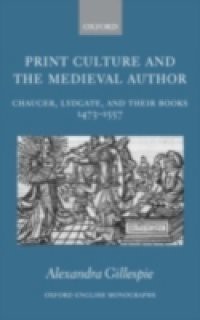Print Culture and the Medieval Author is a book about books. Examining hundreds of early printed books and their late medieval analogues, Alexandra Gillespie writes a bibliographical history of the poet Geoffrey Chaucer and his follower John Lydgate in the century after the arrival of printing in England. Her study is an important new contribution to the emerging 'sociology of the text' in English literary and historical studies. At the centre of this study is a familiar question: what is an author? The idea of the vernacular writer was already contested and unstable in medieval England; Gillespie demonstrates that in the late Middle Ages it was also a way for book producers and readers to mediate the risks - commercial, political, religious, and imaginative - involved in the publication of literary texts. Gillespie's discussion focuses on the changes associated with the shift to print, scribal precedents for these changes, and contemporary understanding of them. The treatment of texts associated with Chaucer and Lydgate is an index to the sometimes flexible, sometimes resistant responses of book printers, copyists, decorators, distributors, patrons, censors, owners, and readers to a gradual but profoundly influential bibliographical transition. The research is conducted across somewhat intractable boundaries. Gillespie writes about medieval and modern history; about manuscript and print; about canonical and marginal authors; about literary works and books as objects. In the process, she finds new meanings for some medieval vernacular texts and a new place for some old books in a history of English culture.

